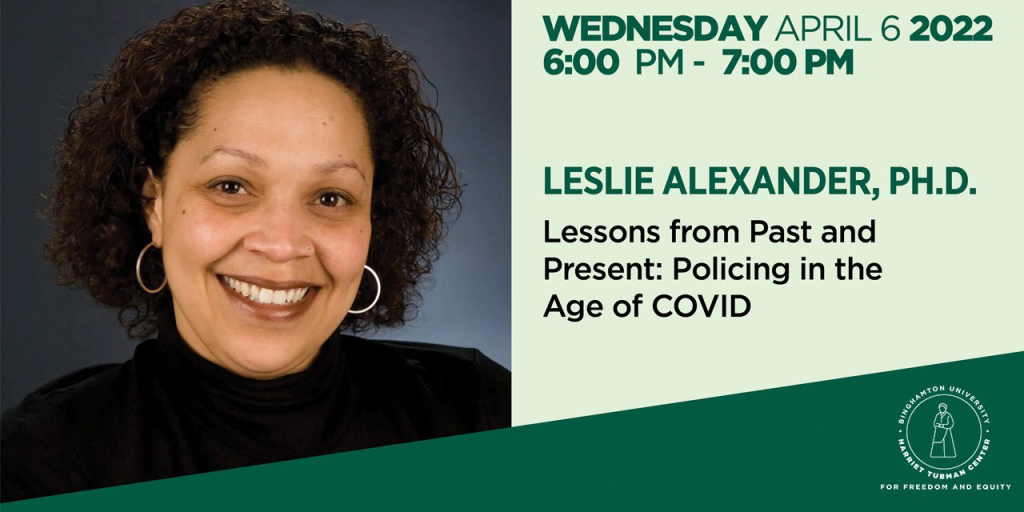Leslie Alexander, an associate professor of African and African American studies at Arizona State University, gave a virtual presentation about policing and its roots in slavery in the United States on Wednesday.
As a specialist in early African American and African Diaspora history, Alexander focuses particularly on late 18th and early 19th century Black culture, political consciousness and resistance movements. Her presentation, titled “Lessons from Past and Present: Policing in the Age of COVID,” reviewed the history of policing since the founding of the United States, and its impact on modern policing and systemic racism.
The talk was held by the Harriet Tubman Center for Freedom and Equity with support from multiple departments and organizations on campus, some of which include the Institute for Genocide and Mass Atrocity Prevention, the department of Asian and Asian American Studies and the Campus Citizens Review Board (CCRB).
Alexander began by speaking about victims of police violence during the past two years, such as George Floyd and Breonna Taylor, and the importance of demonstrating care and compassion for each other.
Alexander also spoke about how the long history of policing and vigilante violence has impacted Black communities, and gave examples from the United States’ 250-year history. She said that as a historian, she believes people need to study history to fully understand the situation of the present.
“Since the founding of this nation, Black strivings for liberation have been demonized, criminalized and subjected to persecution, while white people’s demands for liberty are deemed rational, legitimate and largely unthreatening,” Alexander said. “There has never been a time in American history when Black people’s quest for freedom and equality did not spark existential fear among white people, frequently leading to a violent response. A deep-seated, gnawing terror that Black people might one day rise up and demand for themselves the same freedoms and inalienable rights that led white colonists to declare the American Revolution has shaped American politics, culture and systems of justice ever since.”
Binghamton University President Harvey Stenger attended the virtual talk and thanked Anne Bailey, co-director of the Tubman Center and a professor of history, for helping to organize the event and Alexander for educating those in attendance.
“This was really interesting and thoughtful, and it brings hard conversations to the top of the pile,” Stenger said. “I know that the people on this call are people who are used to hard conversations. My job is to bring these conversations to people who aren’t on this call. Thank you for bringing this knowledge to this group today.”
Caroline Sandleitner, the BU Council Representative and a first-year graduate student studying public administration, also attended the talk. Sandleitner said she thought the talk was powerful and inspired an interesting discussion from the audience during the Q&A period.
“I attended today’s talk to support the newly established … Tubman Center, and to hear what our community feels about policing and [COVID-19] given the currency of these issues,” Sandleitner wrote in an email. “Studying the past is the best way to inform our future, and I think conversations like the one today are essential to creating an environment where all students feel safe and represented on campus.”
Bailey said she aimed to provide an important space for students with Alexander’s talk.
“We chose Dr. Alexander because of the [Truth and Reconciliation] process and testimonies from some students and staff of color about relationships with the police on campus and in the community at large,” Bailey wrote in an email. “This is a national issue, as you know, and we wanted to face it head-on. We wanted to create a forum where there could be great exchange of ideas and dialogue and that is exactly what happened.”
During the Q&A, Flavio Darini, an attendee and a junior majoring in philosophy, politics and law, asked Alexander about the kinds of strategies she recommended for raising awareness of the issues of systemic racism in policing — particularly among white people — as well as what methods of framing the issues people should avoid when trying to educate others.
In response, Alexander said that it is important to not alienate people and to stay away from language that tries to shame or blame others when attempting to educate.
“I feel like it’s my job as a historian and a thinker to tell the truth,” Alexander said. “And the truth is hard for people. That’s why I was saying before [in the talk], even in my classes, I have to talk my students through some of the material that’s being presented because it’s hard, and it’s ugly and it’s painful. But it’s also real. And I think that if we want to make radical change, we have to be willing to present radical ideas and to push from the margins and challenge people to have the difficult conversations that need to be had.”



